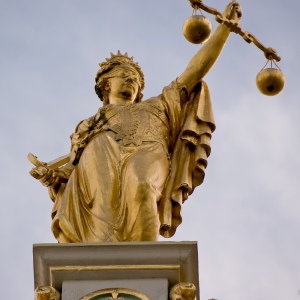Opinion: Washington’s Farewell Address provides stark warning for Americans

Gilbert Stuart’s 1796 oil on canvas portrait of George Washington on display at Washington’s National Portrait Gallery. AP file
| Published: 01-19-2024 6:00 AM |
Jeff Frenkiewich teaches social studies at Milford Middle School. He is an adjunct professor of education at the University of New Hampshire. The views expressed here represent those of the author, not Milford School District or UNH.
On Sept. 19, 1796, George Washington published his Farewell Address. In it, America’s “founding father” announced his retirement and explained his reasons for not seeking a third term as president. Nervous about the upcoming election that threatened to tear apart the country he loved, Washington also offered his fellow citizens, “some sentiments which are the result of much reflection” (p. 4).
With New Hampshire’s first-in-the-nation primary just around the corner and a divisive general election later this year, we would be wise to consider George Washington’s advice, as it is just as relevant today as it was 228 years ago.
Washington’s America, much like today, was a nation divided by regional differences and sectional interests. Our first president could have predicted a time when politicians openly call for a “national divorce” based on regional differences, and state legislatures feel empowered to debate the idea of secession.
Rebutting those who look to divide America, Washington argues that a unified country brings us, “greater strength, greater resource, proportionably greater security from external danger, a less frequent interruption of their peace by foreign nations; and, what is of inestimable value!” (p. 8) He states, “your Union ought to be considered as a main prop of your liberty, and that the love of the one ought to endear to you the preservation of the other.” (p. 8)
Washington acknowledges that regional differences exist between the North and South, East and West, but he is urging us to consider that the whole is greater than the sum of our parts; a break up of our union will only damage the liberty and prosperity that we have worked so hard to secure.
Washington is not shy in identifying the cause of animosity between regions of the United States — political parties. Washington states, “One of the expedients of party to acquire influence within particular districts is to misrepresent the opinions and aims of other districts.” (p. 9) Foreshadowing a media saturated with disinformation, Washington says, “You cannot shield yourselves too much against the jealousies and heart burnings which spring from these misrepresentations. They tend to render alien to each other those who ought to be bound together by fraternal affection.” (p. 9) Again, our unity provides us strength, and only those who wish to weaken the United States look to exploit the perceived differences amongst our people.
For Washington, the end result of political parties stoking regional divisions is despotism – a dictatorship. He states, “The disorders and miseries which result gradually incline the minds of men to seek security and repose in the absolute power of an individual; and sooner or later the chief of some prevailing faction, more able or more fortunate than his competitors, turns this disposition to the purposes of his own elevation on the ruins of public liberty… It agitates the community with ill founded jealousies and false alarms, kindles the animosity of one part against another, foments occasionally riot and insurrection.” (p. 13-14)
Article continues after...
Yesterday's Most Read Articles
 After four decades collecting carts, Ricky Tewksbury will retire when Shaw’s closes mid-April
After four decades collecting carts, Ricky Tewksbury will retire when Shaw’s closes mid-April
 ‘If you’re proud of it, we want to see it’: Cars & Coffee on Capitol returning to Concord
‘If you’re proud of it, we want to see it’: Cars & Coffee on Capitol returning to Concord
 Ahead of House vote, Democrats rally for a ‘better budget’ to fund education, healthcare and more
Ahead of House vote, Democrats rally for a ‘better budget’ to fund education, healthcare and more
 High school girls’ lacrosse previews: Former Hopkinton coach Zahn takes over Concord rebuild
High school girls’ lacrosse previews: Former Hopkinton coach Zahn takes over Concord rebuild
 Mental health funding facing House cuts, drawing concern
Mental health funding facing House cuts, drawing concern
 ‘A wild accusation’: House votes to nix Child Advocate after Rep. suggests legislative interference
‘A wild accusation’: House votes to nix Child Advocate after Rep. suggests legislative interference
What would Washington say about a candidate for president who actively created jealousies and false alarms with his lies about the outcome of an election? What would he say about a president who sat idle as his followers engaged in insurrection, storming the Capitol? What would Washington think of a candidate who admitted he would be dictator on the first day of his presidency?
In his Farewell Address, a letter that runs just over 6,000 words, George Washington uses the pronouns “you” or “your” 75 times (he used “yourselves” twice). Washington is speaking directly to us, the American people, making clear that despite the cult of personality that surrounded him, he was only one of many responsible for the nation’s welfare; it is “We the People” who are the stewards of our republic.
Washington knew that we would be challenged in preserving our Union; he knew that sectional divisions would promote a spirit of party and that these factions would produce a want-to-be despot surrounded by his own cult of personality. We the people are the only guards against such a dictatorship; we must heed Washington’s warning and do everything we can to preserve our union. We must protect our democracy from those who wish to put their own self-interests above the interests of our Union. Please vote in this upcoming election.







 Opinion: An attack on the legal profession is an attack on us all
Opinion: An attack on the legal profession is an attack on us all Opinion: HealthTrust's decision to drop anti-obesity medications is a step back in the fight against a chronic disease
Opinion: HealthTrust's decision to drop anti-obesity medications is a step back in the fight against a chronic disease Opinion: Courage and care count
Opinion: Courage and care count
